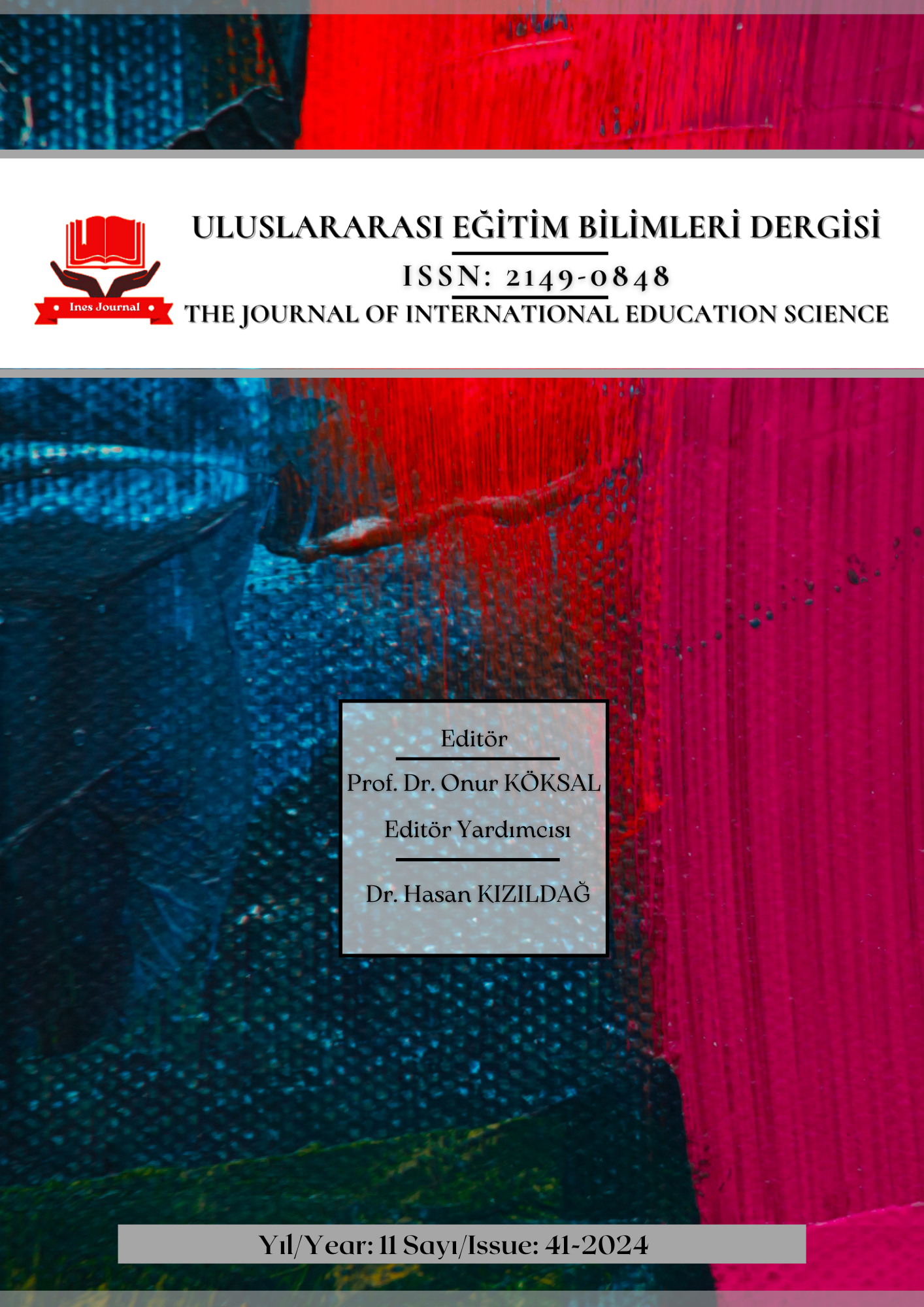Author :
Abstract
Öğretmenlerin mesleki imajları ile kişilerarası problem çözme becerilerinin incelenmesi amacını taşıyan bu araştırma nicel araştırma deseni olan genel tarama modelinde ilişkisel tarama tekniği kullanılarak gerçekleştirilmiştir. Araştırmanın evrenini; Burdur il, ilçe ve belde-köylerinde görev yapmakta olan 3.275 öğretmen oluşturmaktadır. Örneklem ise evren içerisinden uygun örnekleme yöntemi ile seçilmiş olan 301 öğretmen oluşturmuştur. Araştırmada veriler, “Öğretmenlik Mesleği İmaj Ölçeği” ve “Kişilerarası Problem Çözme Envanteri” ile toplanmıştır. Ölçeklerden elde edilen veriler, IBM SPSS 26.0 Windows paket programı kullanılarak analiz edilmiştir. Araştırma sonucunda öğretmenlerin mesleki imaj algıları “katılıyorum” düzeyinde çıkmıştır. Bu sonuca göre, öğretmenlerin mesleki imajları ile ilgili algılarının yüksek düzeyde olduğu söylenebilir. Öğretmenlerin mesleki imaj algıları; cinsiyete göre ölçek alt boyutlarında anlamlı farklılık olmadığı fakat ölçek genelinde kadınların lehine farklılık olduğu görülmüştür. Yine öğretmenlerin mesleki imaj algılarında; yaş, mezun olduğu lise türü, kıdem yılları ve eğitim durumu göre anlamlı farklılık görülmemiştir. Diğer yandan öğretmenlerin mesleki imaj algıları görev yapılan eğitim kurumu, branş, görev yeri, öğretmenlik mesleği memnuniyeti ve öğretmenlik mesleğini tercih nedenlerine göre anlamlı farklılık olduğu sonucuna varılmıştır. Araştırmanın diğer boyutu olan öğretmenlerin kişilerarası problem çözme becerileri ise “uygun” düzeyinde çıkmıştır. Öğretmenlerin kişilerarası problem çözme becerileri cinsiyete göre kadınların lehine farklılık gösterdiği görülmüştür. Öğretmenlerin kişilerarası problem çözme becerileri yaş, eğitim durumu, kıdem yılı, branş ve görev yapılan eğitim kurumuna göre anlamlı farklılık görülmemiştir. Ancak öğretmenlerin kişilerarası problem çözme becerileri; mezun olduğu lise türü, öğretmenlik mesleği memnuniyeti, öğretmenlik mesleğini tercih etme nedenlerine göre anlamlı farklılık olduğu ortaya çıkmıştır. Öğretmenlerin mesleki imaj ile kişilerarası problem çözme becerileri arasında düşük düzeyde ve istatistiksel olarak anlamlı pozitif yönde ilişki bulunmuştur. Buna göre öğretmenlerin mesleki imaj algıları olumlu yönde arttıkça kişilerarası problem çözme becerilerin de arttığı söylenebilir.
Keywords
Abstract
This study aims to examine the relationship between teachers' professional images and their interpersonal problem-solving skills. The research was conducted using the relational survey technique, a quantitative research design under the general survey model. The population of the study consists of 3,275 teachers working in the province, districts, and towns/villages of Burdur. The sample was composed of 301 teachers selected from the population using convenience sampling method. Data were collected using "Teaching Profession Image Scale" and the "Interpersonal Problem-Solving Inventory." The data obtained from the scales were analyzed using the IBM SPSS 26.0 software package for Windows. The findings revealed that teachers' perceptions of their professional image were at "agree" level. Based on this result, it can be stated that teachers' perception of their professional image is high. There was no significant difference in the sub-dimensions of scale based on gender, but difference in favor of women was observed across the entire scale. No significant differences were found in teachers' professional image perceptions based on age, the type of high school they graduated from, years of experience, or education level. On the other hand, significant differences in teachers' professional image perceptions were observed based on the type of educational institution they worked at, their subject area, the location of their workplace, satisfaction with the teaching profession, and the reasons for choosing the teaching profession. Regarding the other dimension of study, teachers' interpersonal problem-solving skills were found to be at a "satisfactory" level. Teachers' interpersonal problem-solving skills also showed differences in favor of women based on gender. However, no significant differences were found in terms of age, education level, years of experience, subject area, or the type of educational institution where they worked. Nevertheless, significant differences in interpersonal problem-solving skills were observed based on the type of high school they graduated from, satisfaction with the teaching profession, and the reasons for choosing the teaching profession. A low but statistically significant positive relationship was found between teachers' professional image and their interpersonal problem-solving skills. Accordingly, it can be suggested that as teachers' perceptions of their professional image improve, their interpersonal problem-solving skills also increase.





